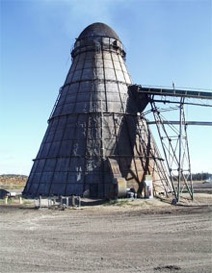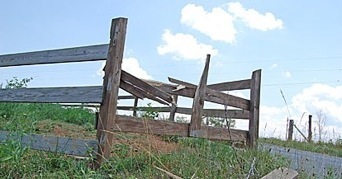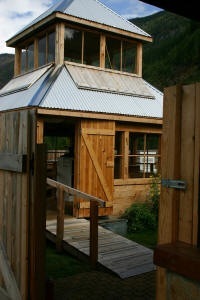Workbook
here are some preliminary sketches and ideas for our upcoming production of the trespassers

We take no responsibility for this image which appears in the Stratford brochure. We sort of like it and think its provocative though which I suppose is the point. If people dont know anything about the play and little about the author, they are looking for something that intrigues them, and this picture suggesting a naked Noah Reid with a peach in his mouth ought to raise some eyebrows. It is often assumed that artists have a hand in the publicity for a show, and although in the past Morris has gone toe to toe with theatre marketers, its been pretty much a question of diminishing returns, and anyway, they dont tell us how to make theatre so we decided not to tell them how to sell it. Though it does somewhat raise again the T S Eliot question, dare I eat a peach?

Left, a David Cooper photo of Joe Zeigler, who plays the grandfather, Hardy. Joe worked with us in Blithe Spirit at Soulpepper. Not only is he the best actor in the country he is also one of the most affable and thoughtful. Joe took part in early readings of the play which we did at Canadian Stage and casting him in the part quickly became a foregone conclusion. Joe is likewise a brilliant director who has had many successes in Toronto and at the Shaw Festival. This year he directs A Moon for The MIsbegotten.
below, Globe and Mail article from June 08





Left, a peach orchard in the Okanagan Valley, above R, a commanding view of lake Skaha below Penticton, home of the Peach Festival; many orchards have been transformed in recent times into vineyards. Morriss father, Peter, was a big fan of Okanagan peaches and loved to vacation there with the family. Before his death the family had a reunion there. Below, an excerpt from the play
Mill towns once thrived in B.C., where forestry was for many years the backbone of the provincial economy. Over time, many mills have closed and others have moved away. Some towns have reinvented themselves as tourist destinations, but many have simply fallen in to a kind of sweet sad disrepair. In The Trespassers, which takes place in an unnamed mill town, the mill was made redundant as were its employees. Is a business responsible for the well-being of the people who built it? Or should it be held accountable?

Kelli Fox, R, plays Lowells mother, Cash, a woman who turns to Christianity in crisis. This is the first time Morris is working with this wonderful and talented actress but Ken worked with her years ago in Vancouver in an Ian Weir play, The Delphic Orioles

Studio Theatre in and out. Seats over 200; not quite but almost in the round, with audiences on three sides. Trespassers is especially challenging owing to the number of times the action shifts and how quickly. In a way, this kind of space works better because of the pure theatricality of it.
The character Milton, who interrogates Lowell, is a member of a local RCMP detachment. Small towns and even some cities in Canada are policed by the national force.

Lowell is held for questioning by the police in this play; fifteen year olds have certain rights to protect them, but how are these rights upheld; there are those who would argue that a youth may not know his rights.

Before the advent of social justice and modern common law, rules for social behaviour came from divine sources, such as the Bible; the ten commandments of the old Testament have helped shape Western tradition and law. Interestingly, not killing is only the fifth commandment, following rules of obedience and honour; not stealing is the seventh. Trespassing is not a commandment but a concept of wrongdoing mentioned in the Lords prayer, the idea being that one should both forgive and be forgiven.

The broken fence is an initial idea we have been playing with for the production. It symbolizes so many things, like the breakdown of order in the world.
DIRK MEISSNER
The Canadian Press
June 21, 2008
VICTORIA Carol Perron says she cant come right out and say it, but deep down she knows she's making plans for two deaths, Her husband's and her communitys.
Ms. Perron lives in Mackenzie, a forest industry town in B.C.s rugged north that's been dropped to its knees by a failing U.S. housing market and the strong Canadian dollar.
Most of Mackenzies 4,700 residents are employed in the forest industry, but every sawmill in the surrounding area is shut down indefinitely and more than 1,200 people are out of work.
I don't think we'll see a change here until about 2010, said Perron, echoing B.C. government forecasts that at least 18 months of hard times are ahead.
Related Articles
From the archives
Pope Talbot mill can be sold, court rules
AbitibiBowater posts $248 million loss
Northern towns gang up on carbon tax
Theres nothing more. The town is dying
Ms. Perron said she and her husband, Jack, have lived in Mackenzie for 37 years. They raised four boys and dreamed of staying in the community, located about 185 kilometres north of Prince George, for the rest of their lives.
Now Jack, a former heavy equipment operator at the downed Canfor sawmill, is terminally ill and the economic prospects for Mackenzie are bleak. The Perrons are being forced to consider other plans, she said.
It puts a halt in everything that you are looking forward to in terms of your retirement, she said. We wanted to be the grandparents around our kids. This would be devastating because that would mean we would have to move.
Two sons have already left town, one for Saskatchewan and one for Vancouver Island.
One of her boys is employed in mining in Mackenzie, but another has been laid off since November, Ms. Perron said.
They're trying to tough it out because they don't want to move, she said.
But her unemployed son and his family are barely making it.
Mackenzie is considered ground zero of B.C.s forest industry melt down due to its almost total dependence on forestry, but other communities are hurting as much as the pulp and lumber industry slowly grinds along.
Late last week, Western Forest Products, citing a soft U.S. market, announced it would shut down sawmills on Vancouver Island and the Queen Charlotte Islands for July and August, laying off almost 2,000 workers.
Hundreds of forest workers across British Columbia in Campbell River, Kamloops, Fort Nelson, Fort St. James and Grand Forks have been thrown out of work as sawmills and pulp mills announce shut downs or permanent closure.
On the heels of the softwood lumber dispute and the destruction of the Mountain pine beetle, the current market conditions have been devastating.
B.C. Forests Minister Rich Coleman said the government doesnt have the ability to flick a magic switch that brings back jobs, but it can attempt to ensure the B.C. forest industry is competitive and viable in the coming decades.
Hes been taking heat from unions and the New Democratic Opposition, who say the government hasn't done enough. Mr. Coleman maintains the government will not use tax dollars to prop up ailing sawmills.
Economics professor Cornelis van Kooten is equally blunt.
Unfortunately, there's very little you can do other than handouts, and you don't want to do that, said the professor at the University of Victoria, who describes himself as a right leaning environmentalist.
Mr. van Kooten said B.C.s forest industry will survive, but it needs to become more efficient to stay in business and rural communities like Mackenzie need to look at economic opportunities other than forestry if they want a future.
The bigger thing is, what kind of shape is that forest industry going to be? Is it going to be a lean mean machine for generating economic wealth or is it going to stagger along as an old man; creating jobs or trying to hold jobs that are being lost on a daily basis? he said.
Communities dependent on forestry must need to face up to reality, An efficient industry means fewer jobs, Mr. van Kooten said.
Youre in an industry where you've got to be efficient, and efficiency means you've got to shed jobs, and if you're shedding jobs then you're community isn't as big, Mr. van Kooten said.
He said the B.C. government has decided to plan for the future rather than offer bailouts.
The Liberals, their attitude is, we're due and, lets let it hit, Mr. van Kooten said. We'll try and soften the impact where we can, but basically, there's nothing we can do.
Opposition New Democrat forest critic Bob Simpson agrees that problems in the U.S. economy have hurt B.C.s forest industry, but disagrees with the government's hands off policy.
We need a strategy from the province, and it's something that the forests minister, in a normal environment, with a normal forests minister, would roll up his bloody sleeves, call the industry together and sit down and say, Weve got to figure this out boys, Mr. Simpson said.
He said the government should have controlled the amount of timber shipped to the U.S. markets in an effort to keep the entire industry running on a reduced basis, as opposed to shutdowns, layoffs and closures.
You all go to three day shifts, Mr. Simpson said. Well work with the federal government and well top you up on the two days for your wages. Then, every community is taking that hit. It keeps the mills and the machines running. Then Mackenzie doesnt lose 1,500 people, and Fort. St. James, and Grand Forks is completely down.
The United Steelworkers Union, which represents many of B.C.s forest workers, says B.C. has lost 20,000 forest industry jobs since 2001 when the Liberals were elected.
The union issued a 10 point plan last March that was immediately rejected by the Liberal government because it called for the abrogation or reform of the hard won Canada U.S. Softwood Lumber Agreement.
Back in Mackenzie, Dale Parker, a supervisor at the idled Abitibi Bowater sawmill, said Mackenzie will likely see changes, but the forest industry will never die there and neither will the town.
The wood basket weve got up here in Mackenzie, its one of the best in the province, he said. It's got more long term life in it than probably anywhere in the province. Really, its just a matter of when.
Mr. Parker, 41, has lived in Mackenzie for 21 years. He started working on the sawmill floor and worked himself up to a management position.
Until I have to move, and I don't plan on moving, he said.
Below., another excerpt from the play in which we learn a little about Grandpas union affiliation and his propensity for gambling.

Economic theorist Karl Marx would have been proud of Hardys principled stand against the capitalists which in this play wins him only the ire of fellow citizens

Ludwig Fueurbach inspired Karl Marx, believing that human beings had created God in their own image, himself inspired by the writings of Hegel. Interesting to note how Marxist economic theory is in some ways an offshoot of religious philosophy, but anybody who knows the connection between, for instance, the United Church of Canada and the CCF will not find this surprising.
LOWELL
Grandpa was the union representative; did I say that? Industrial Wood and Allied Workers. He negotiated for the union because he was so good at bluffing.
HARDY
I stood those boys down.
LOWELL
Thats why things ended up the way they ended up in our town.
CASH
No its not.
LOWELL
He bluffed so well, the company folded.
HARDY
They think I let them down.
CASH
The mill closed for other reasons.
LOWELL
To this day, a lot of those guys wont speak to him at all. Like if they saw him in the bar, they would move tables just not to be near him, if they still lived here, that is
There is no shortage of museums, like the one Cash works in, commemorating the forest industry in British Columbia, and although we have never been to one, we are pretty sure they are about as interesting as they sound

When Morris was a kid growing up in Edmonton he lived across the street from a wealthy estate called The Gold Bar Farm whose owners lived in France and were almost never around; although there were many No Trespassing signs, trespassing on this property was a regular occurrence. There were no peaches there, but they did grow apples which were regularly stolen as a right of passage. The trough referred to in the play was inspired by one located at the back of this very large property where horses were at one time watered. The farm belonged to Jean de la Bruyere, a real estate millionaire who had at one time owned all the property in the area

Rob King plays Milton

Noah, without the peach

Stratford veteran Lucy Peacock plays the somewhat controversial role of Roxy, who is everything the name suggests.


